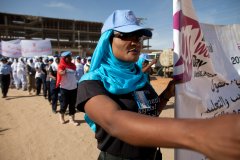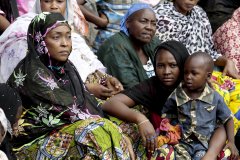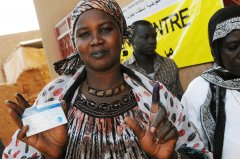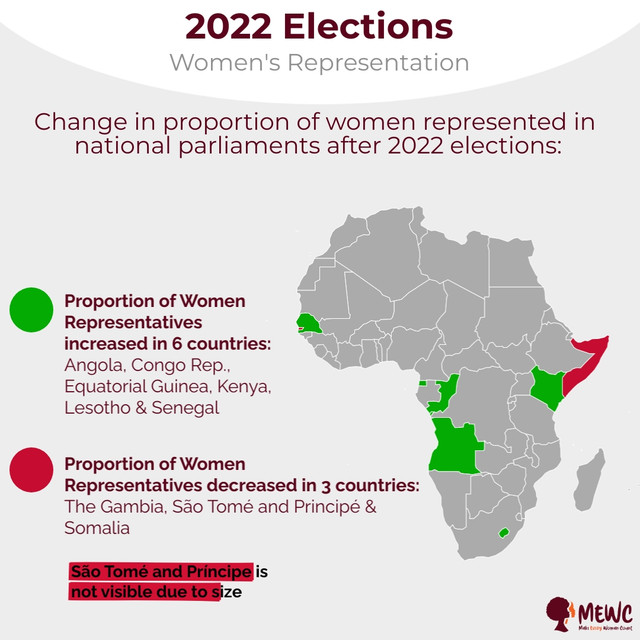Gender Issues Showlist
Women, Peace & Security
UNSCR 1325 calls on all parties to: protect and respect the rights of women and girls in conflict & post-conflict; increase women participation in all conflict resolution, peacekeeping and peace-building & to end impunity by prosecuting perpetrators of sexual and other violence on women and girls
index.php?option=com_content&view=category&id=56&Itemid=1913
Human Rights of Women
Thirty six years after the adoption of CEDAW, many women and girls still do not have equal opportunities to realize rights recognized by law. Women are denied the right to own property or inherit land. They face social exclusion, “honor killings”, FGM, trafficking, restricted mobility, early marriage,...
index.php?option=com_content&view=category&id=44&Itemid=1908
Violence Against Women
Violence against women is the most shameful human rights violation. Gender based violence not only violates human rights, but also hampers productivity, reduces human capital and undermines economic growth. It is estimated that up to 70 per cent of women experience violence in their lifetime
index.php?option=com_content&view=category&id=69&Itemid=1912
Political Participation & Leadership
Where women are fully represented, societies are more peaceful and stable. Women political participation is fundamental for gender equality and their representation in positions of leadership must be a priority for all Africans governments.
index.php?option=com_content&view=category&id=65&Itemid=1911
Latest News
- COTE D'IVOIRE: South-South Meeting to Promote Gender Equality and Combat Deforestation
- RWANDA: Rwanda Set to Launch Cervical Cancer Elimination Plan
- NIGERIA: Over 5,000 Nigerian Women Stranded in Iraq - Govt
- SUDAN: Healthcare Collapse Threatens Pregnant Women in Sudan's Sharg El Nil
- GHANA: President Nominates 12 More Ministers
- Senegal: Parliamentary election 2024
- Mauritius: Parliamentary election 2024
- Ghana: Presidential and Parliamentary Elections
- Botswana: Parliamentary elections 2024
- Algeria: Presidential Election 2024
NIGERIA: Nigeria And Boko Haram 'Agree Ceasefire'
Source: BBC News
Nigeria's military says it has agreed a truce with Islamist militant group Boko Haram - and says the schoolgirls the group has abducted will be released.
Boko Haram sparked global outrage six months ago by abducting more than 200 schoolgirls.
Nigeria's chief of defence staff, Alex Badeh, announced the truce. Boko Haram has not made a public statement.
The military has struggled to defeat Boko Haram, an Islamist group that has fought an insurgency since 2009.
The girls were seized in the north-eastern town of Chibok, and their continued captivity has led to criticism of the Nigerian government's efforts to secure their release.
Air Chief Marshal Badeh revealed the truce at the close of a three-day security meeting between Nigeria and Cameroon. He said Nigerian soldiers would comply with the agreement.
'Cautiously optimistic'
Nigerian presidential aide Hassan Tukur told BBC Focus on Africa that the agreement was sealed after a month of negotiations, mediated by Chad.
As part of the talks, a government delegation twice met representatives of the Islamist group.
Mr Tukur said Boko Haram had announced a unilateral ceasefire on Thursday and the government had responded.
"They've assured us they have the girls and they will release them," he said.
"I am cautiously optimistic."
He said arrangements for their release would be finalised at another meeting next week in Chad's capital, Ndjamena.
The negotiations are said to have the blessing of Boko Haram leader Abubakar Shekau, reports the BBC's Chris Ewokor in Abuja.
Who are Boko Haram?
Boko Haram leader Abubakar Shekau is the most wanted man in Nigeria
Founded in 2002
Initially focused on opposing Western education - Boko Haram means "Western education is forbidden" in the Hausa language
Launched military operations in 2009 to create Islamic state
Thousands killed, mostly in north-eastern Nigeria - also attacked police and UN headquarters in capital, Abuja
Some three million people affected
Declared terrorist group by US in 2013





